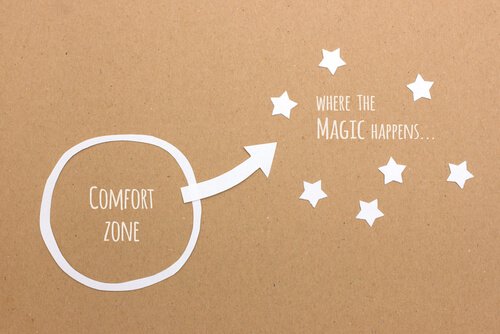Giving Up vs. Knowing When to Quit


Written and verified by the psychologist Valeria Sabater
There are stories, relationships, and connections that have given all they have to give. They are like a rope that has been pulled too tight or a comet trying to escape that we can’t hold on to. They are like a train leaving on schedule that we can’t stop. Letting these things go is not an act of cowardice or surrender. Knowing when to quit is an act of bravery.
If there is something we aren’t prepared for, it is distancing ourselves from people who are significant in our lives. It is difficult for us to stop investing time and energy into a project or job that was important to us until very recently. We say “we aren’t prepared” because our brain is very resistant to change. Any kind of break from routine or habit is a leap into the unknown that generates fear in this wonderful and sophisticated organ of ours.
“That’s enough!” cried the heart. And for once, he and the brain agreed on something.
The brain’s inclination to always keep us in the same place, doing the same thing, with the same people, makes it difficult to leave our comfort zone. This almost obsessive attachment to what we know makes us say things like “I will stick it out a little longer” or “I’ll just wait a bit longer to see if things change”.
However, one thing we already know for sure is that certain changes never come. Sometimes waiting a bit longer means waiting too long. We’ve been raised with the classic and unjustifiable idea that “what doesn’t kill you makes you stronger”. We’ve been taught that abandoning something or someone means that we’ve given up and our will is broken.
Now, looking past the “problem”, we see complete and crushing unhappiness. This is something physical. It simply robs us of air and life. Leaving these types of situations behind, at least for a while, is undoubtedly a courageous and healthy act.

Knowing when to quit isn’t always easy
When we trip, fall, and hurt ourselves, we don’t think twice about getting better. We learn to avoid the dangerous part of the sidewalk. Why don’t we do the same with our relationships? Why don’t we avoid situations that have caused us pain or suffering? This simple question has an answer with aspects as complex as they are delicate.
In the first place, in real life we don’t deal with sidewalks full of holes or paths covered in rocks. We know that these metaphors are overused, but the problem is that real-life dangers are never so easy to accurately identify. We don’t wear signs advertising what we are like, how we love, or what intentions we have. Secondly, it’s important to remember that we are creatures with many needs: attachment, belonging, community, free time, sexuality, friendship, work, and lastly, change. People are dynamic by nature. We mutate.
These very human variables force us to take these leaps into the unknown. We take these risks so we can try something new, have different experiences, and even sometimes for survival. On occasion, we give the least deserving people second and third chances because our brain is pro-social. It will always value connection over distance, and the known over the unknown.

All that helps us to understand why it’s so difficult for us to know when something has crossed the line. We have trouble identifying when the costs far outweigh the benefits and when our own mind acts like our enemy, whispering “don’t give up, don’t give in” to us over and over. However, we need to assimilate something basic and essential into our brain: when we leave something behind that is harmful and making us unhappy, we aren’t giving up. We are SURVIVING.
Learn to discover your “sweet spot”
Finding our sweet spot is like finding our own balance, our psychological and emotional homeostasis. It’s all about knowing what is best for ourselves at all times. It is worth mentioning that this ability isn’t intuitive. It is objective self-learning acquired through experience, observation, and reflection on our own lives, learning from our successes and mistakes.
“Nothing is enough for the man to whom enough is too little.”
–Epicurus–
The “sweet spot” is when everything we are doing and achieving is beneficial and satisfying. However, the moment that stress, bewilderment, fear, tears, or extreme exhaustion enters the scene, we’ve crossed over to the “bitter spot”: an unhealthy space that we should leave as soon as possible.

Note that this simple strategy can be applied in any situation in our lives. Finding the sweet spot is an act of wisdom. It is a personal tool that helps us understand that everything in life has its limit, and knowing when to quit isn’t the same as giving up. It is understanding what and where our limits are. We are talking about the line that separates happiness from unhappiness, bitterness from opportunities.
Let’s work this sweet spot into our day-to-day, and improve the quality of our lives.
There are stories, relationships, and connections that have given all they have to give. They are like a rope that has been pulled too tight or a comet trying to escape that we can’t hold on to. They are like a train leaving on schedule that we can’t stop. Letting these things go is not an act of cowardice or surrender. Knowing when to quit is an act of bravery.
If there is something we aren’t prepared for, it is distancing ourselves from people who are significant in our lives. It is difficult for us to stop investing time and energy into a project or job that was important to us until very recently. We say “we aren’t prepared” because our brain is very resistant to change. Any kind of break from routine or habit is a leap into the unknown that generates fear in this wonderful and sophisticated organ of ours.
“That’s enough!” cried the heart. And for once, he and the brain agreed on something.
The brain’s inclination to always keep us in the same place, doing the same thing, with the same people, makes it difficult to leave our comfort zone. This almost obsessive attachment to what we know makes us say things like “I will stick it out a little longer” or “I’ll just wait a bit longer to see if things change”.
However, one thing we already know for sure is that certain changes never come. Sometimes waiting a bit longer means waiting too long. We’ve been raised with the classic and unjustifiable idea that “what doesn’t kill you makes you stronger”. We’ve been taught that abandoning something or someone means that we’ve given up and our will is broken.
Now, looking past the “problem”, we see complete and crushing unhappiness. This is something physical. It simply robs us of air and life. Leaving these types of situations behind, at least for a while, is undoubtedly a courageous and healthy act.

Knowing when to quit isn’t always easy
When we trip, fall, and hurt ourselves, we don’t think twice about getting better. We learn to avoid the dangerous part of the sidewalk. Why don’t we do the same with our relationships? Why don’t we avoid situations that have caused us pain or suffering? This simple question has an answer with aspects as complex as they are delicate.
In the first place, in real life we don’t deal with sidewalks full of holes or paths covered in rocks. We know that these metaphors are overused, but the problem is that real-life dangers are never so easy to accurately identify. We don’t wear signs advertising what we are like, how we love, or what intentions we have. Secondly, it’s important to remember that we are creatures with many needs: attachment, belonging, community, free time, sexuality, friendship, work, and lastly, change. People are dynamic by nature. We mutate.
These very human variables force us to take these leaps into the unknown. We take these risks so we can try something new, have different experiences, and even sometimes for survival. On occasion, we give the least deserving people second and third chances because our brain is pro-social. It will always value connection over distance, and the known over the unknown.

All that helps us to understand why it’s so difficult for us to know when something has crossed the line. We have trouble identifying when the costs far outweigh the benefits and when our own mind acts like our enemy, whispering “don’t give up, don’t give in” to us over and over. However, we need to assimilate something basic and essential into our brain: when we leave something behind that is harmful and making us unhappy, we aren’t giving up. We are SURVIVING.
Learn to discover your “sweet spot”
Finding our sweet spot is like finding our own balance, our psychological and emotional homeostasis. It’s all about knowing what is best for ourselves at all times. It is worth mentioning that this ability isn’t intuitive. It is objective self-learning acquired through experience, observation, and reflection on our own lives, learning from our successes and mistakes.
“Nothing is enough for the man to whom enough is too little.”
–Epicurus–
The “sweet spot” is when everything we are doing and achieving is beneficial and satisfying. However, the moment that stress, bewilderment, fear, tears, or extreme exhaustion enters the scene, we’ve crossed over to the “bitter spot”: an unhealthy space that we should leave as soon as possible.

Note that this simple strategy can be applied in any situation in our lives. Finding the sweet spot is an act of wisdom. It is a personal tool that helps us understand that everything in life has its limit, and knowing when to quit isn’t the same as giving up. It is understanding what and where our limits are. We are talking about the line that separates happiness from unhappiness, bitterness from opportunities.
Let’s work this sweet spot into our day-to-day, and improve the quality of our lives.
This text is provided for informational purposes only and does not replace consultation with a professional. If in doubt, consult your specialist.







